- Home
- Thomas H. Cook
Sandrine's Case Page 7
Sandrine's Case Read online
Page 7
Some truths hit harder than others, but none drops you to the mat like the sudden awareness not that it had ended badly but that it had begun badly. In Sandrine’s case, with an idealistic dream of building a school in some forsaken corner of the world.
I walked around the block one time, then returned to the house. Alexandria was sitting in the living room. She had obviously been waiting for my return.
“I’m not eight years old,” I told her. “Or eighty.”
She looked at me sourly, like a little girl scolded.
“I’m fine,” I assured her, now trying to show genuine appreciation for her concern. “Really.”
She rose, then walked down the short corridor. “Good night,” she called as she stepped inside what she still called her “old room.”
She had been sleeping there since her mother’s death, and I had no doubt that she would sleep there until the verdict was announced. Then, one way or another, she would go on with her life. But how, I wondered, thinking of that last day, of Sandrine in the dark of that last night, the unspeakable things we’d said to each other, could I go on with mine? Some things crack, and some things shatter, and after that final exchange I’d known that our marriage was like the little white cup Sandrine had hurled at me, beyond repair . . . so why go on?
There are times when a darkness falls over you, thick and impenetrable, and later, as I lay alone in my bed, I experienced one of those moments. I didn’t want to read or watch television, but more than anything I didn’t want to sleep. Sleep had become the time when I felt vulnerable, a police interrogation room where my mind threw up issues I’d rather not confront.
And so I lay in the darkness, fighting that moment when my self-control would lose its grip and I would drift helplessly into whatever thought assailed me. But to my surprise it was simply a memory that came to mind, and a pleasant one at that.
I am in Washington Square, sitting on one of the park’s many benches, reading. It is an autumn day, and despite being quite engrossed in my book I become aware of someone standing motionlessly just a few feet in front of me. At first, I don’t even know if it is male or female, but the minute I glance up the question is resolved because what stands before me is as lovely a young woman as I have ever seen.
“You’re not very handsome,” she says. “But you look very intense.”
I nod shyly, still for all my graduate studies a small-town boy, dressed in frayed jeans and a checkered shirt.
“What do you do?” she asks. “When you’re not reading?”
“I’m finishing up my doctorate here at NYU.”
“Is that all?” she asks.
“Well, I’m working on a novel,” I confess.
Clearly she has heard this before. “Anything else?”
“At the moment, I’m teaching retarded kids. Not far from here. On the Bowery.”
“What do you teach them?”
“Basic skills,” I answer. “Keeping clean, making change. Things that will help them get through life.”
She smiles and something in her eyes touches me as physically as the tips of her fingers might have. “Well, that’s the bottom line,” she says.
“I guess you could call it that,” I say.
“We would be an odd couple,” she says, then smiles as she sits down beside me, takes the book from my hands, reads a little of it, then looks up at me, her gaze at once penetrating and tender. “Perhaps that’s our destiny.” She offers her hand. “Sandrine.”
Still adrift in the ebbing tide of that moment, I felt something give way, and with its loosening came a flurry of those disturbing questions I’d come to dread each night when I went to bed: What had Sandrine been thinking as she died? Had she gone to her death still confident that I would never hurt her, having never glimpsed the nature of my crime?
PART II
The trial of Samuel Madison for the murder of his wife enters its fourth day at the County Courthouse in Coburn, following three days of testimony from various EMS workers, along with that of the county pathologist. Mr. Madison is accused in the death of his wife, Sandrine, on November 14 of last year. Mr. Madison was a professor of literature at Coburn College, a post from which he has resigned. It is not yet known whether he will testify in his own behalf.
Coburn Sentinel
January 14, 2011
DAYS TWO AND THREE
Time
The next two days of testimony had been excruciatingly boring. The good news was that they’d passed in a haze of technical issues I’d had no need to recall and Morty had had no need to dispute. The EMS workers had testified that Sandrine was dead when they arrived, and that they had retrieved the body and taken it to the Coburn County mortuary. Officials at the mortuary attested to the fact that her body had never been moved after its arrival. The pathologist, one Dr. Earl Mortimer, had testified next, surprisingly uninteresting testimony, given that I’d long ago been apprised of his findings, details Mr. Singleton had surely not forgotten, as Morty assured me, and which no doubt would arise in some other, later testimony. Others came and went, all of them witnesses whose task it was to establish the fact that nothing having to do with the care and treatment of Sandrine’s remains in the time following her death could possibly be used by the defense to argue that the chain of evidence had at any point been broken or that any part of said evidence had been tampered with.
Thus had the hours dragged by.
Of course, as a reader, I knew that a great many things had been written about time. It was a river. It was a thief. It was money to Benjamin Franklin and a dream to Conrad Aiken. Tolstoy had thought of it as a warrior, but as my trial continued I found myself recalling that it had been the peculiar power Shakespeare had ascribed to time that Sandrine had most often quoted, the notion that it voided cunning, that nothing could outfox it. In other words, that murder, in the end, would out.
As for myself, I knew only one thing for sure about time, that during the second and third days of my trial it had moved at a snail’s pace as one witness after another took the stand, droned on for a while about nothing of any true relevance to my actual guilt or innocence, then stepped down from the witness box.
Only memories had made the clock’s turgid movement bearable, and during those many hours of tedious testimony I’d spent a great deal of time remembering my years with Sandrine.
I remembered that she and I had gone for a long walk after that first meeting on Washington Square, all the way north, in fact, and into Central Park. I was tall, but not dark, and hardly what anyone would call handsome. In fact, if truth be told, I’d looked like the lanky farm boy I was, a kid from Minnesota who’d miraculously been admitted to NYU and who, over the following years, had gone further and further up the academic ladder, getting increasingly better scholarships, garnering a few English Department awards. The PhD had come pretty much as a matter of course, but I’d found it insufficient to guarantee a high academic post. That had mattered very little to me, however, because my heart had been set upon writing a great novel, something I’d felt quite certain of doing at some point. College teaching, with its long vacations and occasional sabbaticals, would provide the time.
And so it had been a man in the grip of a grand artistic hope that Sandrine had come upon that fall afternoon when I’d appeared “intense” to her, and she’d appeared beautiful to me, a vision sweeping over to sit beside me, joking about what an odd couple we would be, then sweetly adding that such might be our destiny.
I had never known a woman like Sandrine, a woman as gifted in so many different ways, and yet who seemed absurdly unaware of those very gifts. She hardly noticed the heads she turned, the eyes that drank her in. She hardly noticed when she uttered some elegant turn of phrase or came up with some piercing insight. She offered everything save any awareness of all the many things she offered, and in that way she was, and al
ways remained, so it had seemed to me, spectacularly down to earth. A few weeks after we’d met, when I’d asked her flatly what she wanted, her answer had so astonished me that I actually laughed: Someday, a baby.
We’d been in my closet-sized apartment, together on my thin mattress, wrapped in my cheap sheets, and she’d suddenly sat up, the upper half of her body immaculately white as the sheet fell from her.
“Why does that make you laugh, Sam?” she asked.
I laughed again. “Anyone can have a baby. I’m talking about what you want out of life.”
She looked at me very seriously. “Someday, a baby,” she repeated firmly. “Maybe with you.”
I took her at her word this time. “Why me?”
I’d considered this an entirely legitimate question at the time. I’d had little to offer her, after all. Sure, I was smart, but so were God knows how many other young men in New York City. I spoke only English, and had traveled very little, while Sandrine spoke fluent French and had lived abroad for extensive periods. My stock was humble, to say the least, my parents simple working people. Sandrine was the favored daughter of two university professors.
So, yes, I thought now, as yet another witness trudged toward the stand, yes, it had been a quite honest and heartfelt question I’d asked Sandrine that afternoon, and repeated now, Why me?
She’d watched me for a moment, clearly sifting through all the information she had by then gathered about me until she’d found the one thing that, for her, answered my question. Then she drifted back down to me and rested her head on my shoulder in that classically tender, trustful pose.
“Because you’re kind,” she said.
There are moments when our accumulated errors and missteps invade us like a hostile army, and by the end of the third day of my trial, when this memory assailed me, it was an invasion whose unexpected force threatened to break the calm demeanor I’d so far presented to the court. Before that moment I’d sat in utter silence, completely still. I’d faced the witnesses squarely and offered no visible response to anything they’d said. But in the surprising insistence of that particular recollection I felt the emergence of a second, far darker tribunal, the grand inquisitor in his black robe, demanding to know what really happened, how with so starry a beginning I’d reached this starless night.
To regain control of myself, I battened down the hatches of my own memory, concentrated on the happy moments, the simple, justice-of-the-peace marriage upon which Sandrine had insisted, our brief Mediterranean idyll, the job offers Sandrine had found waiting for her upon our return.
There had been quite a few of them, all of them from prestigious universities, a great career opening before her, the chance to teach in Boston, Stanford, or Chicago, the promise of fine libraries, brilliant students, time to write the great book I knew was in her. But only Coburn had made a double offer, jobs for both of us.
“Let’s take this one,” she said as she handed me a letter on light blue stationery.
She was sitting on the floor of our tiny apartment, her legs stretched across the hooped rug we found in a flea market.
I drew it from her fingers. “Coburn College?” I asked.
“We’re married, Sam,” Sandrine said. “Married people stay together.”
She’d seemed entirely satisfied with the house we later bought here, and which she’d never expressed the slightest desire to leave or expand or renovate. She’d thrown herself into her teaching and in her spare time set up an easel in the backyard and painted, though with no interest in exhibiting her work. “No, I’m an amateur, Sam,” she’d answered when I’d quite honestly suggested that her work was worth exhibiting. “I do things for the love of them.”
The “someday, a baby” moment had arrived the following year, and the painting gave way to motherhood. During those early months, while I’d slaved at my intransigently stubborn novel, she’d often carried Alexandria into town and strolled about the square, going into this shop or that one, showing off our new daughter to the surprisingly large number of townspeople she’d come to know by then.
Once, when Alexandria was five, I’d found them gathering a few brilliantly colored fall leaves in the town park.
“We’re going to make a crown,” Sandrine told me happily. “Caesar’s laurel, only from oak leaves.”
I was tired and disheartened at the progress of my novel. Hope deferred does make the heart sick, and it was in the grip of that sickness that I’d spoken. “So I guess it’s to be a laurel of Coburn leaves rather than a book on Cleopatra or Hypatia or any of—”
“Stop it,” Sandrine interrupted. She looked at me sternly. “So what if I never write a book,” she said, her head proudly erect. “It’s not a crime.”
She didn’t wait for a response.
“You’re the one who wants to write a book, Sam,” she said defiantly, “not I.” Then she reached down and took Alexandria’s hand and led her away from me, across the broad lawn, a glowing sea of red and yellow leaves, Coburn arrayed in all its autumn splendor.
I’d always expected that if Sandrine betrayed me it would be for love of another man. But that afternoon, growing angrier as she and Alexandria drifted farther and farther away, I felt I’d been cuckolded by a town.
The sound of Judge Rutledge’s gavel returned me to the present, a hard banging that seemed not unlike the one I suddenly and quite disturbingly felt thudding in my chest.
“Court will resume tomorrow morning at nine o’clock,” he said.
And thus was heralded, as some nineteenth-century novelist might put it, the fourth day of my trial.
DAY FOUR
Call Milton Douglas Forsythe
The man who answered to his name on the fourth day of my trial was rather short, and a little round, with such an abundance of snow-white hair I’d at first mistaken it for an Andy Warhol wig. It was no such thing, of course, yet even then, as he made his way to the witness stand, I had to think that some of the jurors were briefly of the same opinion. Two of them were bald and one had prematurely thinning hair. How could they not have suspected that Milton Douglas Forsythe was wearing a fright wig?
He was dressed in a beige suit, with a pale green shirt and brown tie, a mix Sandrine called “dirty salad.”
Where had she said that? I couldn’t remember, though it sounded like something from her youth, something said on a bus or a subway, whispered into my ear and followed by a nod in the direction of the poor soul who’d drawn her fire, but also, and as a matter of course, her sympathy.
By the time I’d emerged from this surmise Mr. Forsythe had already been sworn in and identified himself as the Coburn County coroner, an alliterative job if ever there was one.
“How long have you served in this post?” Mr. Singleton inquired.
“I have been the coroner of Coburn County for the past thirty-two years,” Forsythe answered.
We were then treated to the usual list of professional societies to which the coroner belonged and the various training programs he’d attended and from which he had received certificates. This recitation moved us forward in time so that the jury at last found itself in Forsythe’s office on the morning of November 15, when the phone rang.
“It was Detective Ray Alabrandi of the Coburn Police Department,” he informed the court. “He told me that earlier that morning he’d spoken to a uniformed officer about a death that had occurred here in town the night before.”
“Do you recall the name of that officer?” Mr. Singleton asked.
“Officer Wendy Hill.”
“And what had Officer Hill told Detective Alabrandi?”
“She’d given him information concerning the death of Sandrine Allegra Madison at 237 Crescent Road. And based on that information Detective Alabrandi thought I should look into it. The death had the appearance of a suicide, he told me.”
/> Appearance, I thought, yes.
“Detective Alabrandi wanted me to go to the house before the body was removed,” Mr. Forsythe continued.
“Why so quickly?”
“He said there were odd circumstances,” Mr. Forsythe answered. “So he wanted me to launch a formal investigation right away.”
“A formal investigation,” Mr. Singleton repeated. “And what would that entail?”
“Well, first of all, it would halt any effort to dispose of the body,” Mr. Forsythe answered. “Then there’d be an autopsy, of course. Any suspicion of a suicide would immediately trigger an autopsy. But in this case, as I said, Detective Alabrandi asked me to go to the address of the deceased.”
“All right, and did you subsequently go to the crime scene?”
Morty rose. “Objection, Your Honor, 237 Crescent Road is a house, not a ‘crime scene.’”
“Sustained,” the judge said. “Careful with prejudicial language, Mr. Singleton.”
“Sorry, Your Honor.” He returned his attention to Mr. Forsythe. “All right, did you subsequently go to 237 Crescent Road?”
“I did.”
And indeed he had gone to 237 Crescent Road, looking a bit tired, as I now recalled, a man edging toward retirement and with something in his eyes that suggested he’d seen too many dead bodies over the years.
“I’m Doug Forsythe,” he said when I opened the door. “I’m the Coburn County coroner. I’m very sorry for your loss.”
I couldn’t tell if his small sad smile was genuine or official.
“I’m sure you understand that in a case like this,” he said, “a relatively young woman, the issue of a suicide, that the county requires that I make an investigation.”

 The Interrogation
The Interrogation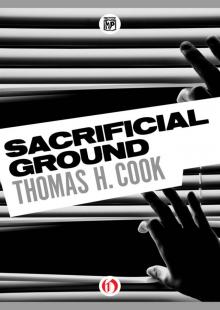 Sacrificial Ground
Sacrificial Ground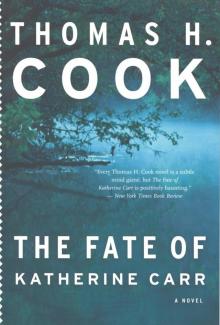 The Fate of Katherine Carr
The Fate of Katherine Carr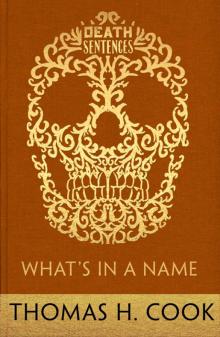 What's In A Name
What's In A Name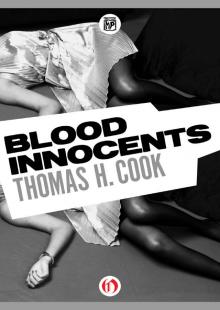 Blood Innocents
Blood Innocents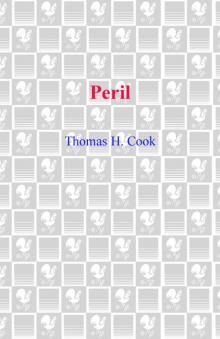 Peril
Peril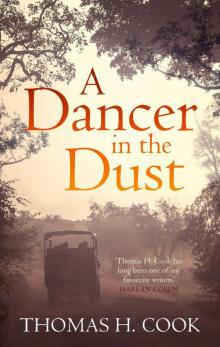 A Dancer In the Dust
A Dancer In the Dust Breakheart Hill
Breakheart Hill The Chatham School Affair
The Chatham School Affair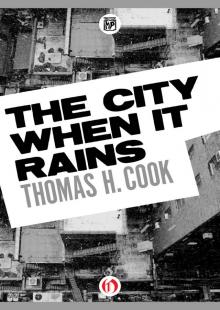 The City When It Rains
The City When It Rains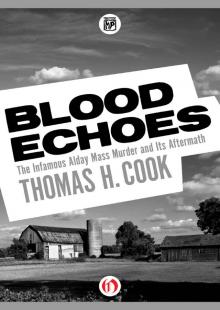 Blood Echoes
Blood Echoes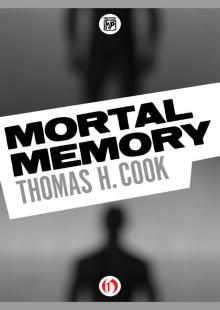 Mortal Memory
Mortal Memory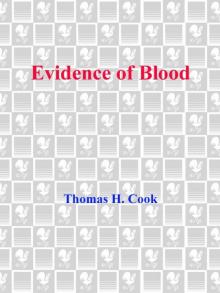 Evidence of Blood
Evidence of Blood Into the Web
Into the Web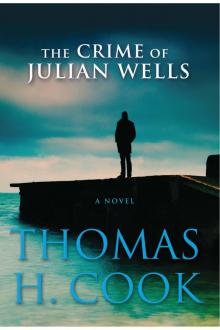 The Crime of Julian Wells
The Crime of Julian Wells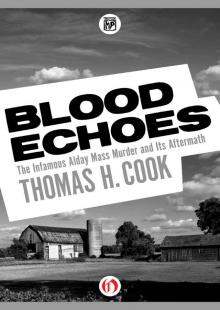 Blood Echoes: The Infamous Alday Mass Murder and Its Aftermath
Blood Echoes: The Infamous Alday Mass Murder and Its Aftermath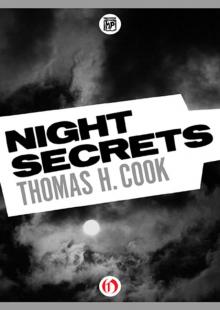 Night Secrets
Night Secrets Places in the Dark
Places in the Dark The Orchids
The Orchids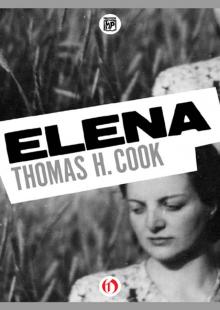 Elena
Elena Streets of Fire
Streets of Fire Instruments of Night
Instruments of Night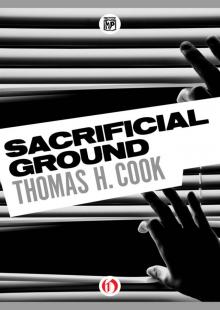 Sacrificial Ground fc-1
Sacrificial Ground fc-1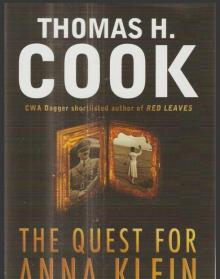 The Quest for Anna Klein
The Quest for Anna Klein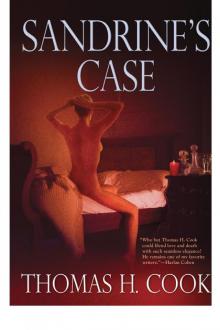 Sandrine's Case
Sandrine's Case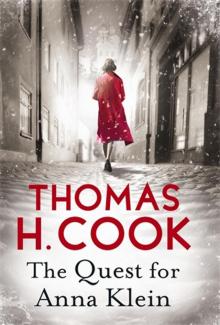 Quest for Anna Klein, The
Quest for Anna Klein, The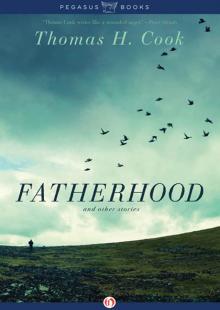 Fatherhood
Fatherhood Flesh and Blood
Flesh and Blood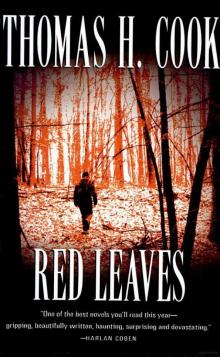 Red Leaves
Red Leaves